Bending The Ruler
Guidelines for race time prediction

Take a look at any runner's wish list of forthcoming races, and you'll probably see a heady mixture of magic miles, marathons, and everything in between. And even though some of us may have a natural preference and ability at a particular distance, our race performances at different distances are linked together.
Running a four-minute mile does not make you a great marathoner, but an improvement at one distance can often prophesise an improvement at another, particularly if the distances are similar.
Your most recent race time can give you a useful insight into your equivalent times across the board, helping you to plan realistic racing and training paces, and highlighting which of your best times might be ripe for reducing. Understanding where you are is the first step to take when looking to the future.
Over the years, a number of systems have come into common use, from the simple to the scientific. Here's a brief overview of three of them:
VO2Max
The harder you work during a run, the greater the volume (V) of oxygen (O2) your body uses. There comes a point where you can't use it any quicker – determined by various things, like the function of your lungs and circulatory system, and the capacity of your muscles to make use of the oxygen. This is referred to as your VO2Max. You can get it measured in a sports science laboratory, or you can estimate it based on a recent race time. Jack Daniels and his colleague Jimmy Gilbert came up with a formula to do just this. And if you work out the estimated figure, and then crank the handle backwards, you can also use it to suggest equivalent performances at different race distances.
Get An Estimate of your VO2Max
Enter a recent race performance:WAVA
Built to enable people of all ages to compare their times, the WAVA system also allows us to compare our performances at different distances. It's based on a study of the best times recorded by top level athletes in different age groups, from nippers to nonagenarians. By looking at how we all slow down as age catches up with us, a system was developed that could boil down every race performance (irrespective of age, gender and race distance) into a figure between 0 and 100. If you'd like to know more about it, here's a more detailed description of WAVA. Once again, if you can work out your WAVA rating for a given race performance, and then work backwards, you can find out the equivalent times at other distances.
Riegel
Peter Riegel created the simplest method of all for prediction by formalising the one rule we all know about racing: you can't run a marathon at your 5k pace! In other words, as race distance gets longer, so your maximum pace drops. The formula is pretty straightforward:
D1 = the distance you've already run
T1 = the time it took you
D2 = the distance you're about to run
T2 = the predicted time.
The 1.06 constant is used to reflect the rate at which we slow down as races get longer. If it was a nice round '1', it would predict that you could run all your races at exactly the same pace. If it was as high as '2', then even the fastest mile runner would take nearly two days to complete a marathon.
Estimate your times using Riegel
Enter a recent race performance:A Comparison
I fed my recent 10 mile race time (1:19:35) to each of these methods to see what they suggested. Here are the predictions:
| Riegel | WAVA | VO2Max | |
| 5K Prediction | 23:03 | 23:22 | 23:07 |
| 10K Prediction | 48:04 | 48:38 | 47:57 |
| Half Marathon Prediction | 1:45:57 | 1:45:32 | 1:46:13 |
| Marathon Prediction | 3:40:55 | 3:39:02 | 3:40:14 |
Despite coming from three rather different methodologies, the results are pleasingly grouped. At one end of the scale, the suggested 5k times are all within 19 seconds, whilst at the upper end, the marathon predictions are within a two minute window. What's most pleasing to me is that the elegant simplicity of Riegel's formula stands up to the more elaborate systems.
A Word of Caution
Although all three broadly agree, most people with a 1:45 half marathon will tell you that converting it into a 3:40 marathon is quite a feat. And there's the crux. These predictions all agree, give or take, and in the laboratories, and at the peak of performance, no doubt they fit the data. But to the rest of us, are these predictions still valid?
In a previous article, I looked at the relationship between half marathon and full marathon bests, and found that the Riegel formula (and by comparison, WAVA and VO2Max) was making some rather punishing marathon predictions. In a sample of over a thousand runners who had completed at least five runs at both distances, only 3% of them managed to equal or better the marathon time that their half marathon suggested. There are also hints of this, albeit less strong, in the transition from 10k to half marathon.
There's no doubt that training for longer races requires a significant amount of focus, and perhaps the seemingly tougher predictions point at the need to reprioritise our efforts. Anecdotally at least, marathon training is often centred around the monolithic long run, and whilst there's no doubt of its benefits, it's possible that this emphasis puts the squeeze on other aspects of training.
It should also be remembered that we often prioritise successful completion, rather than a goal time for our early marathons. Our 5k and 10k runs are more likely to be within the realm of our regular training run distances, which allows us to focus more on time. It would seem that marathons have sufficient gravitas to bend our mental attitude towards training.
Understanding this helps us as we continue our search for the perfect approach to training, the perfect race, and a clear plan for the future. It's another clue that points towards the importance of a well-rounded approach to training. Onwards!
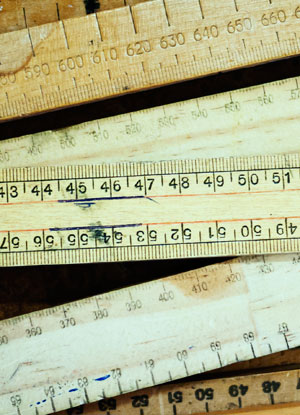
Picture: Getty Images / Donald Iain Smith
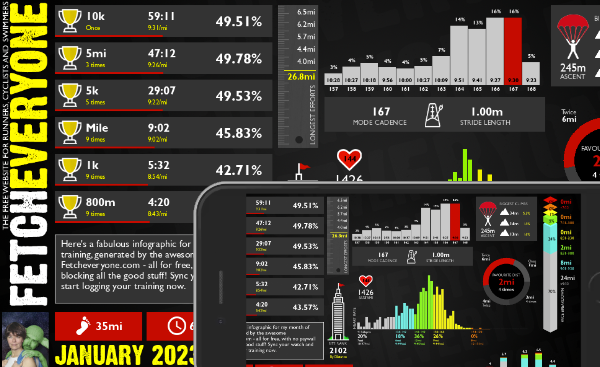
Monthly Summary
A brand new shareable infographic showing a colourful breakdown of your training month.

Marathon Prediction
We delve deeper to give you greater insights when working out your goal marathon time.
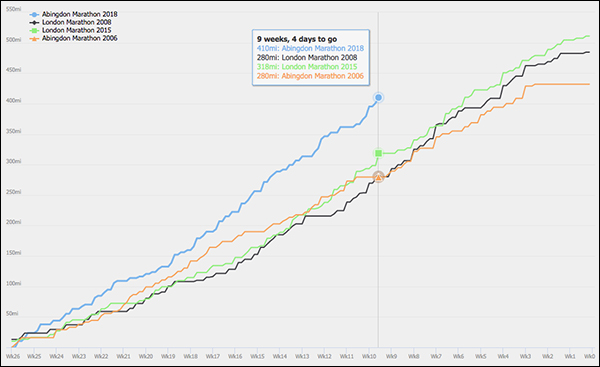
Pre-race Training Analysis
See your accumulated mileage in the weeks leading up to any event in your portfolio, and compare it to your other performances

Your 365 Day Totals
Peaks and troughs in training aren't easy to find. Unless you use this graph. Find out what your peak training volume really is
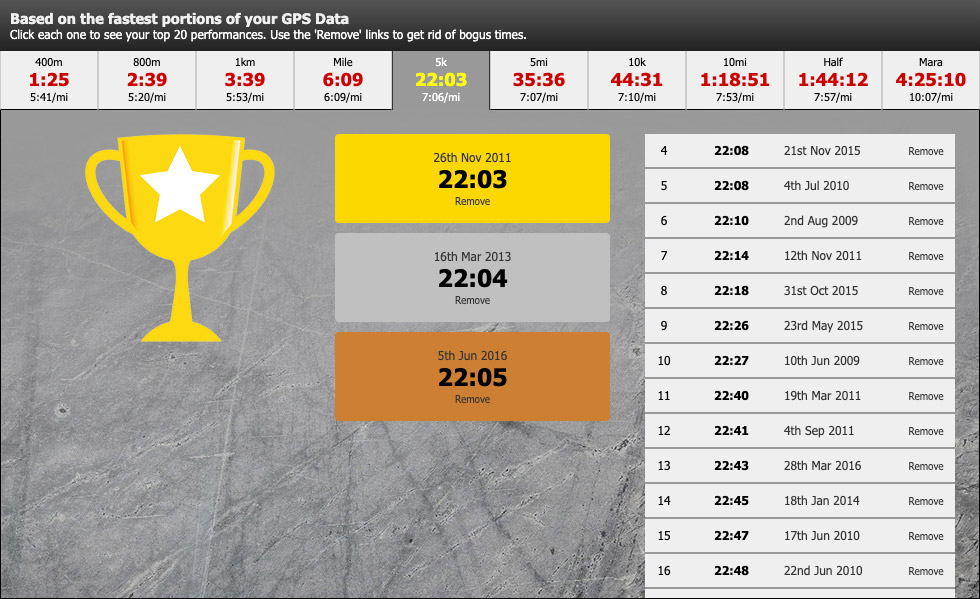
Benchmarks
See the fastest portions from all your training runs. Filter by time to give you recent bests to aim at. Every distance from 400m to marathon.
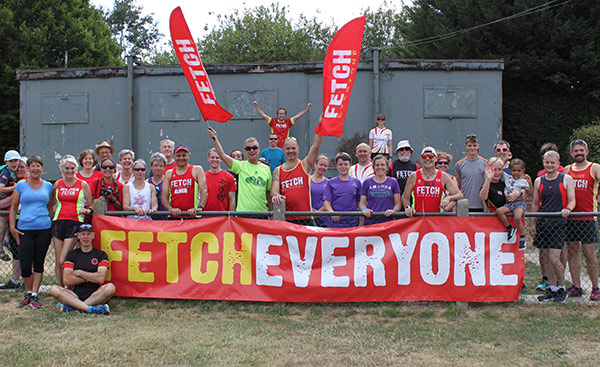
Fetch Everyone Running Club
Join our UKA-affiliated club for event discounts, London Marathon ballot places, the chance to get funded for coaching qualifications, and a warm feeling inside.

Leave a comment...
-
This is really useful stuff. Thanks.

GlennR
-
Article really points out how every aspect of a marathon the training and the race itself is really really time consuming and extremely challenging mentally and physically. Good article.
Huntsman
-
Interesting - I had quite a divergence between my HM times (using a 5k as the benchmark) - with a range from 1.50 to 1.55 - which for me is quite a lot. In terms of 'fitting' my recent results the VO2 max one seemed most accurate.
Autumnleaves
-
Remember, even the 'Shatterproof' wasn't!
 G
G
HappyG(rrr)
-
Fascinating stuff - I absolutely agree that there can be a significant 'drift' between the pace predicted by a half marathon and what can realistically be achieved over marathon distance on the day.
Schnecke
-
Very interesting. I could play with those automatic predictors for hours.....
Bru-Bru
-
love it. Predictors are a cruel mistress . My marathon times are way below my 10k predictor


oldbiddy
-
Is it wrong that I was eating a massive slice of *chocolate*
 while reading this? No? Thought not.
while reading this? No? Thought not.
Ted
-
Linkie no worky. VO2 Max calculator: link to Daniels et al book has no image to click on at the point where it says click on the image.
Angus Clydesdale
-
Strange - seems to be ok for me. Is it still not showing?
fetcheveryone
-
Good stuff - a cruel reality has dawned. If you have a significant drop off between say HM and full marathon it simply means we are not aerobically fit enough. More interval and tempo work required.......there are no short cuts. I also firmly believe that you need at least two years solid running before you can do justice to the marathon distance (other than the 'get round' approach).
MKS
-
This was a good article. I get my wava score for D1 but there are no predictions for any D2.
iPLOD
-
Top work Fetch, I like the article, especially the way you've pulled different aspects together
 Shame my conversion is so poor!
Shame my conversion is so poor! 
-x-x-
-
Sadly, there's no mathematical prediction that accounts for my established tendency to fade and wonk out after 18 miles
 ..... But the theory is excellent, and encouraging!
..... But the theory is excellent, and encouraging!
3M
-
This is very timely, as I have just completed my first halts and am getting ready to run my first marathon next year. One thing that strikes me, is that this doesn't take into account experience, i.e., I have run loads of 5ks, quite a lot of 10ks, and couple of halts, and no marathons. I have just knocked 4 mins of my half pb, within 2 weeks of running the first, that I would put down to purely experience, and I think I could knock another 2 or 3 mins off fairly easily. When I run my first marathon, I will be back to zero experience, and so probably 10-20 mins off my best, and probably predicted time. I will also not be running another marathon within a couple of weeks of the first, so will be on a much flatter learning curve. So whilst I have the potential to run to a predicted time, I think pure inexperience will probably stop me reaching it. Does that make sense?
Dillthedog
-
Yes, but, you also have to take into consideration the course you just ran on. I just did a hilly 10m in 79mins but my best 5k, on the flat this year is 21.31. Otherwise it's all good. Actually I do try and use WAVA and the riegel thing to work out paces for races and training, sometimes it's spot on. It also why the spring maarthon will be interesting because I think one of the big determining factor will be the long runs, not tempo or intervals, but long miles......for all distances.
Ocelot Spleens
-
I think the fact that I can go out and race a parkrun pretty much every Saturday means I am less scared to take a chance and push the pace in a 5k. It also doesn't take long to recover from. But as the distances get longer I am less likely to take a punt on a quick pace for fear of blowing up in the latter stages (which is silly as it doesn't really matter).
GeologyRocks
-
Very good article... all the information necessary and simply put together. I like your comparison charts especially. I also agree that for the correlation between marathon and half marathon to be accurate the individual must have a significant aerobic base built up

Techthick
-
My last three race times have come out to the actual second based on the Riegel formula !
 freaky.
freaky.
Jock Itch
-
I've finally got my marathon time within the correct minute of predicted time. I might retire!


PhilPub
To comment, you need to sign in or sign up!To me, the clearest explanation for the marathon drop-off is that the sheer distance is outside of the normal training session distances. For every other recognised distance, what an experience, reasonably fit runner considers being 'adequately trained' includes short distance at quicker than race pace, slightly longer distance at race pace, and over-distance runs at slower than race pace (even for the half marathon, for fitter runners). Most mere mortals simply can't manage the equivalent training for the marathon, especially over-distance runs and high volume runs at marathon pace. So you train to minimise the drop-off as much as possible but you're unlikely to beat the predictions unless you're some kind of aerobic freak.